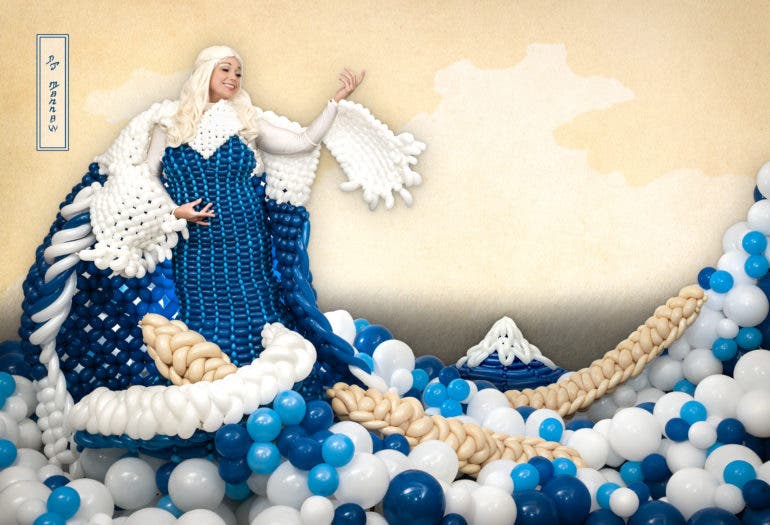
“The pieces I love the most are the ones that speak to real world issues,” says balloon artist and photographer DJ Morrow about the favorites in his work. It’s a complex process to create these intricate displays, but DJ finds it important to give them life. Photographing them comes with many challenges, which he discusses in this candid interview.
We hate banner ads too. Download our app for iOS, iPad, and Android and get no banner ads for $24.99/year.
A single balloon can bring a smile to any child, and it’s always a party favorite. A balloon artists can liven up any child’s day. While DJ Morrow does this, he also knows how to create intricate designs that adults marvel at too. I look at some of his work and wonder how seamlessly puts the balloons together. From conceptualization to storyboarding, right until the creation, DJ does everything with the final look firmly in his imagination. He doesn’t shy from some risque decorations too, but those are for adult eyes only of course.
The Essential Photography Gear Used by DJ Morrow
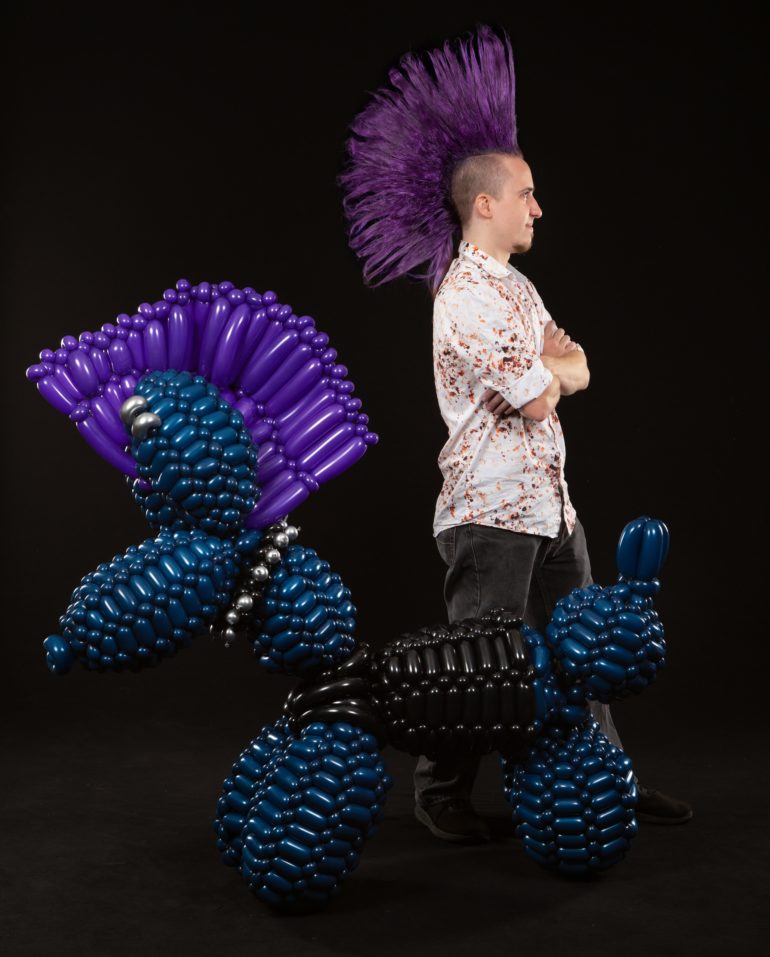
DJ told us:
I typically shoot with a fairly high f stop to keep the entirety of my images sharp and all the shapes well defined. I prefer to achieve depth by having lots of areas of value and color contrast.
The Phoblographer: Hi DJ. Please tell us a bit about yourself and your photography.
DJ Morrow: I’m a balloon artist, photographer, and videographer living in Houston, TX. I started working with balloons a full decade ago, twisting for birthday parties and community events, and over the years, my art has grown more detailed, ambitious, and meaningful, and I’ve had to step up my photography and editing in turn. Over the last two years, my goal has been to push the boundaries of the medium in both the ideas balloons are capable of expressing and the aesthetics usually associated with balloon sculptures.
I started doing professional wedding videography seven years ago, mainly working in the niche of Indian and Pakistani weddings. The equipment and knowledge I’ve accrued doing that have been essential in the creation of my fine art compositions. The videography continues to be my main work, supporting me financially while I work on the fine art in my personal time.
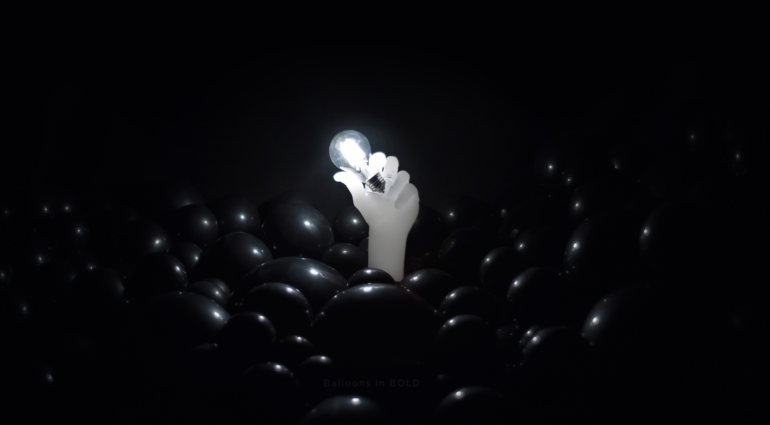
The Phoblographer: Is making balloon decorations and art your main job? When did this start? Do you remember your first gig?
DJ Morrow: At the age of sixteen, it was time for me to start looking for a job to work, and the options available at that age were pretty terrible. My parents had twisted balloons in their twenties and offered to teach me the balloon basics. Within two weeks, I had passed them up and began devouring every bit of educational content on the internet I could find. After a month, I started twisting at local community events.
Twisting balloons would be my main job up until the pandemic nuked the entire entertainment industry in 2020. With no live events to twist at, I started creating more thoughtful and artistic balloon creations at home as a way of dealing with the emotions of despair and anxiety that come with your entire livelihood disappearing. “Reaching” was a piece that spoke on the need for art as a lifeline for me in times of depression and hopelessness. Before this, balloons weren’t something I had really considered a medium for serious artistic expression. Two years on and I find myself working with increasing resolve towards a career as a fine art balloon artist.
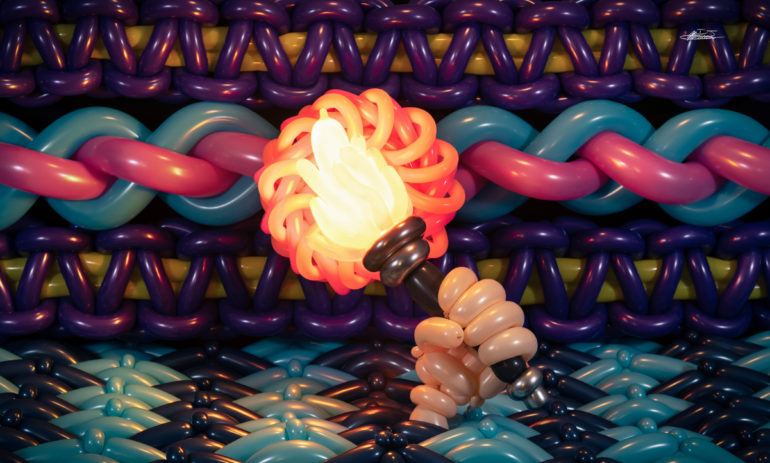
The Phoblographer: Things would have steadily become more complex from there on. More balloons and more intricate designs would have been incorporated. Did you also change how you photographed them so they would look better?
DJ Morrow: For most of my years twisting balloons, the images I’d captured were done with a phone camera without much consideration for lighting or composition. On Valentine’s day in 2019, I was newly single and feeling especially alone, and I twisted a sad clown to express those feelings. I brought a Nikon D750 and a simple two flash setup to the bar I was hanging out at, and the image I left with changed the way I viewed the medium forever (“The Entertainer”). It was emotionally resonant in a way I had never achieved before.
Going forward from there, every serious piece was photographed with that camera, later upgrading to the Z6, with special care paid to how the pieces were lit. Balloons are such a fleeting medium. As the builds get larger and more complex, it becomes so important to nail the image creation, as the sculptures only look ideal for a week or two. The sculpture to me, is not the final product; the image I’m producing is.
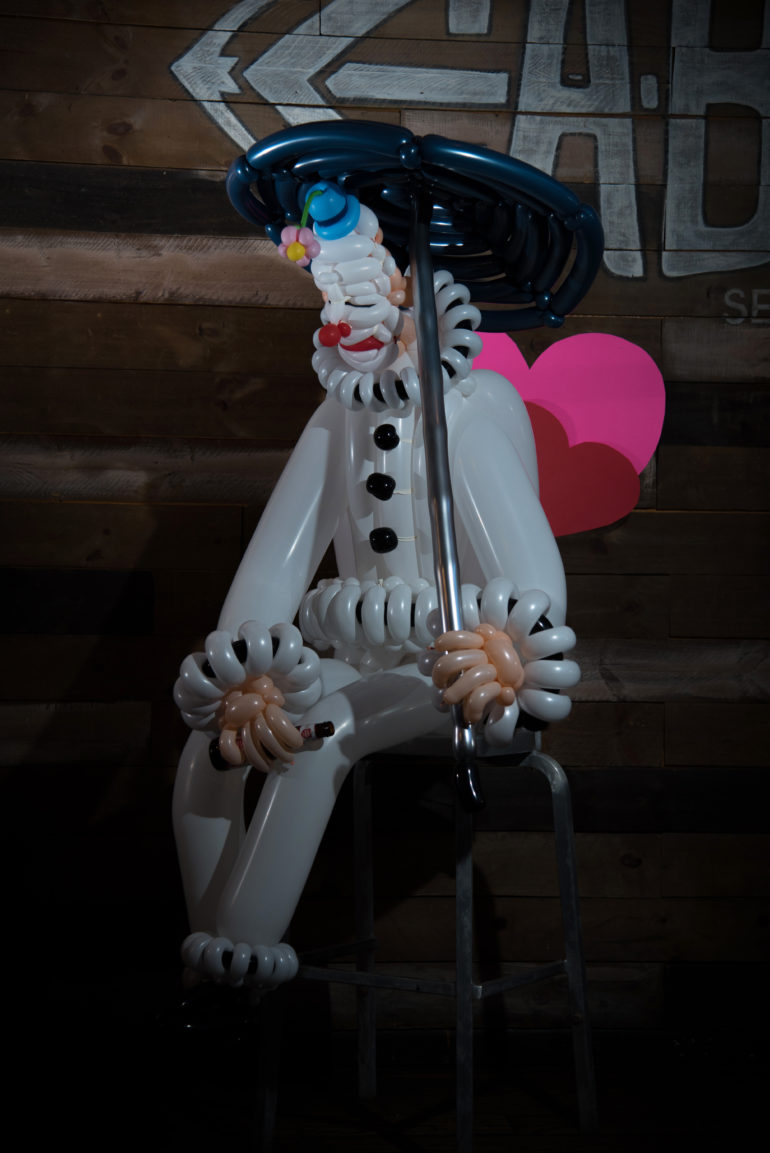
The Phoblographer: Do you usually have a rough idea of how many balloons would be needed while sketching the designs? Or is it more just adding them steadily in layers as you go?
DJ Morrow: My ideas stay in the design phase for sometimes weeks but usually months. By the time I put pencil to paper, I’ve already crafted the image clearly in my mind, and the sketch process is to make sure the composition, color, and lighting all make sense. I sketch things out fairly realistically and go over them afterward, drawing balloons on top to get a sense of how I’m going to balloonify my idea and the scale I need to work in. This helps me decide the scale and techniques I’ll use, and from there, I know how many balloons I’ll need for the build.
I’ll often build prototype models at this stage to work on new twisting techniques. It’s important I’ve decided exactly how I’m gonna build everything and what I’ll need for the build before starting because once the twisting starts in earnest, there’s only a 2-3 day window when the balloons still look pristine and ideal for photography. No time to order more balloons and wait for their arrival.
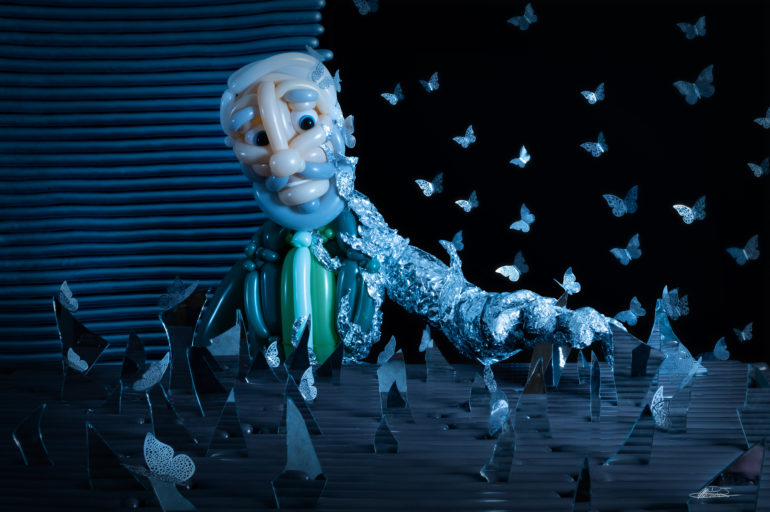
The Phoblographer: What’s the best lighting setup to photograph these? Given the various colors and reflective surfaces all around, is it a straightforward approach?
DJ Morrow: Lighting is everything when it comes to balloons! If I’m capturing a bright image, I love the look of large soft boxes. There’s no one-size-fits-all when it comes to lighting though. No discounting the tasteful use of a single spotlight when making darker, more dramatic images, like my classical painting recreations. When I use a light source in the image itself, like in “Reaching 2021”, I take several shots with the lighting elements separated and composite them in editing. This is something I’ve taken from my experience with rendering in 3d software, where rendering differing lighting passes and compositing them after the fact is common practice.
My sculptures aren’t usually placed in the real world; rather I use a backdrop that I can tweak or edit out completely in post, or I create balloon environments to fill the image. Backgrounds and balloons are tricky. You can’t use a green screen for easy editing because the background color shows up in the highly reflective balloon surfaces. Any background removal is done painstakingly by hand.
The Phoblographer: What’s been the biggest challenge you’ve faced when photographing these on location?
DJ Morrow: The location has primarily just been my living room. These are all passion projects of mine, and my efforts to monetize my work is going to be primarily focused on prints. When a piece needs to be built at a larger scale, finding an appropriate venue to work in has been a challenge. These things usually take two solid days to finish, and it works best when they’re built and photographed on-site rather than transported to the shoot location after twisting. I’d love to use natural outdoor lighting more for different things, but the humidity you find here in Houston, Texas oxidizes the balloons nearly instantly, and they lose their brilliant shine.
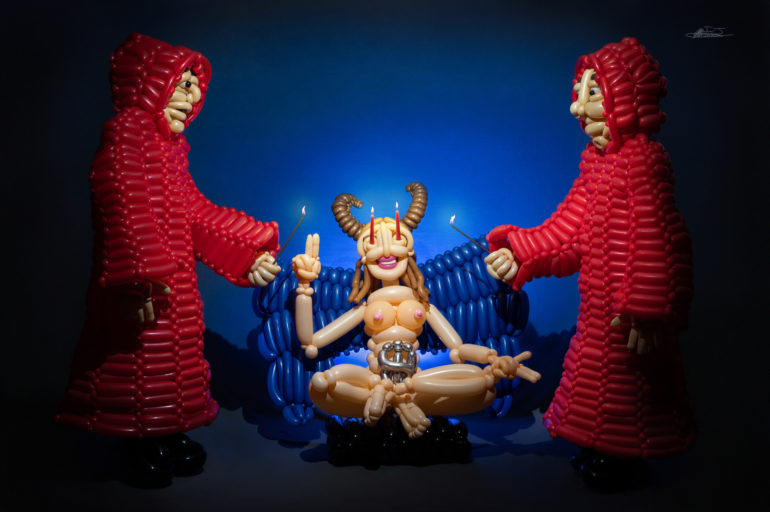
The Phoblographer: When you pose with these creations, have you ever accidentally popped some of the balloons?
DJ Morrow: The shots of me standing inside my creations are always done last, so I don’t have to worry about messing anything up. The balloons pop all the time though. It’s usually not a big deal to repair. The Take These Seeds build was a particularly difficult headache as the blue rounds I had gotten were just awful quality. Half of them would pop on inflation, they all stuck to each other, causing more popping, and they inflated more than they were supposed to, causing the blue and yellow in the wall to be misaligned. It almost ruined the whole build. Sourcing quality balloons has been a struggle since the pandemic disrupted manufacturers’ supply chains. The general quality of the balloons you can get your hands on has also seen a decline.
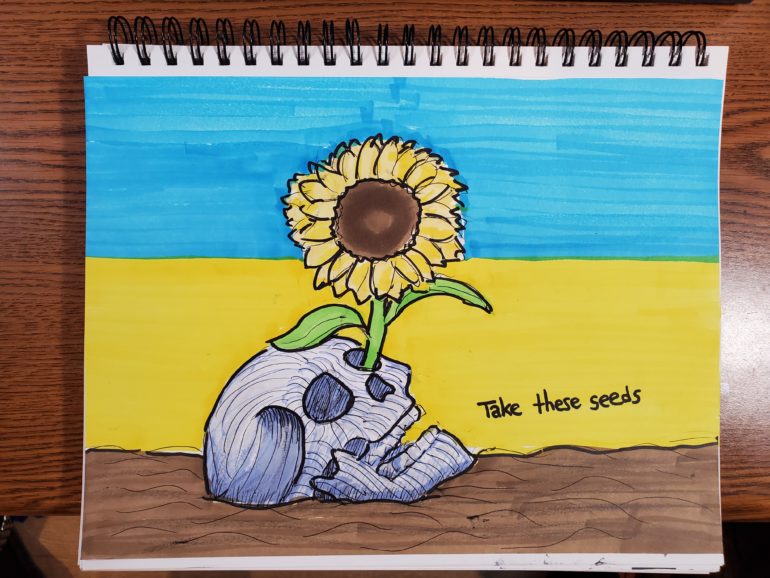
The most devastating balloon pops come when using balloon distortion. This is a technique where you blow up and manipulate smaller balloons inside of other balloons to create more complex shapes, like how I created the woman in “NUDE.” After over two hours of working on that bust, the outer balloon popped, and I had to start over from scratch. For particularly complex distortion shapes, adding more talcum powder inside the balloons makes the distortion process a little bit less risky.
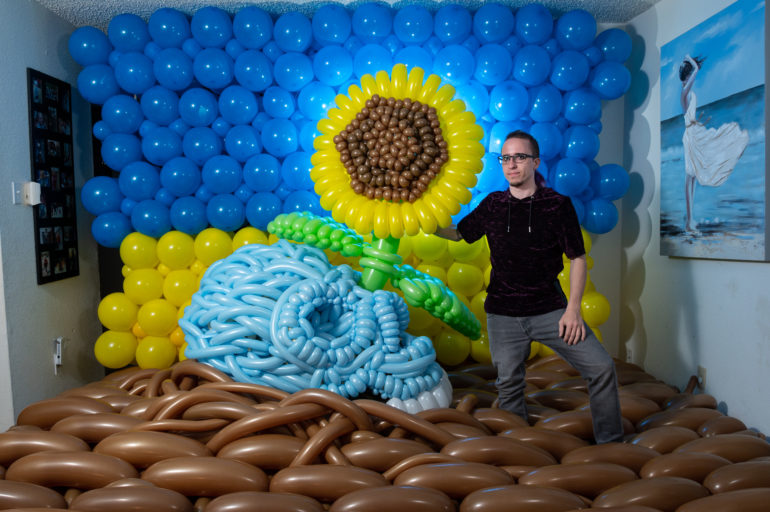
The Phoblographer: There are quite a few NSFW ones in your collection. Typically what sort of events do these get sent to?
DJ Morrow: I’ll occasionally donate some SFW sculptures to my local library after I’m done with the photography, but none of my signature fine art sculptures have been commissioned. I usually end up popping them soon after photography is wrapped, as I don’t have the space or desire to store them.
My balloon recreation of the painting “Saturn Devouring His Son” by Fransisco Goya marked my departure away from a family-friendly aesthetic. I had originally kept myself from posting it to social media, as I was planning on returning to children’s entertainment once the pandemic subsided and events resumed. The only place I uploaded it to was Reddit, and to my surprise, it shot up to the number one post on the whole site that day. That was the kick in the butt I needed to decide to stop limiting myself and start creating honestly.
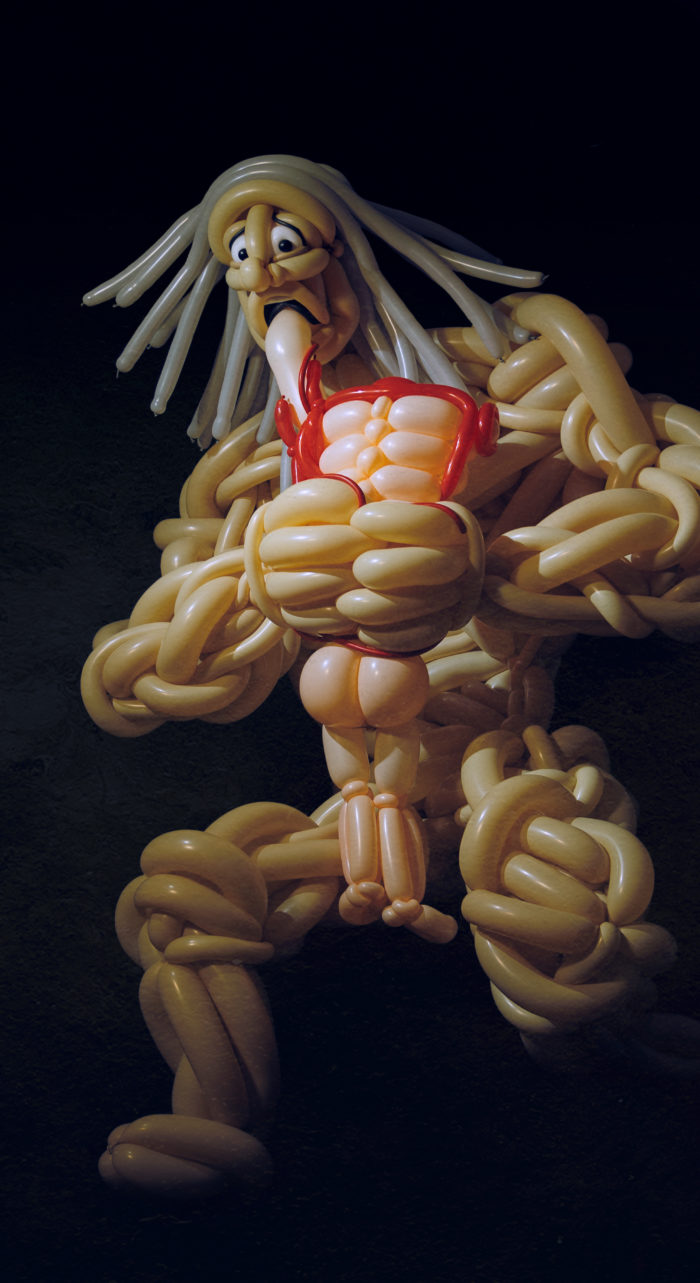
The Phoblographer: Do you also make some of these for yourself and photograph them? Could we see some of the ones closest to your heart?
DJ Morrow: The pieces I love the most are the ones that speak to real-world issues that are important to me. “A Shattered Visage” is about climate change and the world we live in becoming increasingly hostile and unsuitable for life as the climate crisis worsens. “The Feasting of Jephthah” is about right-wing reactionaries fighting against abortion and LGBT rights, often being blind to the harm they cause to those close to them.
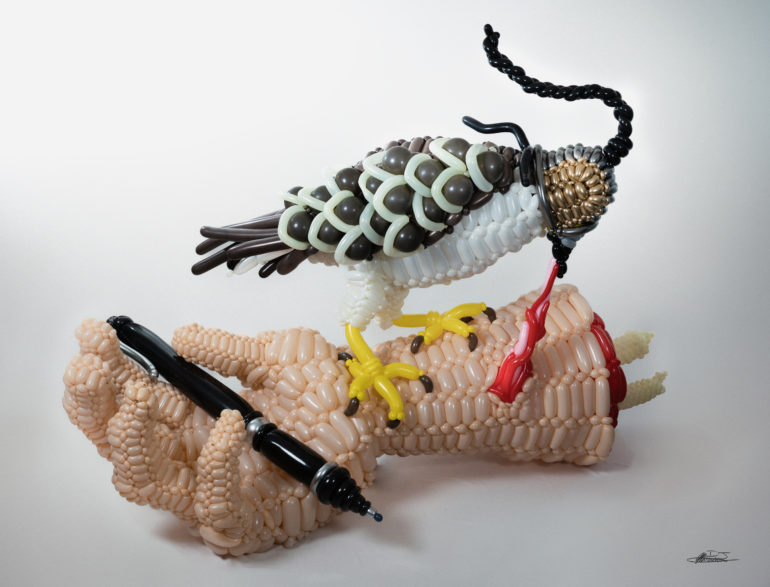
The Phoblographer: There must have been one that was the most complex to create. Which one do you suppose that was?
DJ Morrow: I try to incorporate a new challenging technique with each new piece. “The Great Wave” was challenging because I had never done a full balloon dress before, and the sheer scale and complexity of the build was overwhelming at times. I created a really interesting look for the skull in “Take These Seeds,” inspired by the works of Bekzinski and Giger, that took a lot of experimentation and failed attempts to get right. Working with broken mirror shards and balloons for “A Shattered Visage” was as crazy as it sounds. “The Feasting of Jephthah” was an opportunity to push myself in weaving organic forms to create the enormous hand and fingers.
I have so many more crazy ideas and new techniques I’m waiting to try. Underwater balloons. Two-dimensional creations. Incorporating body-painted models. Comic book page-style collages. Gory imagery. Large-scale abstract painting backgrounds. Art Nouveau linework. Fire. Monochromatic color schemes. So many projects and ideas in different stages of development, each challenging in its own way.
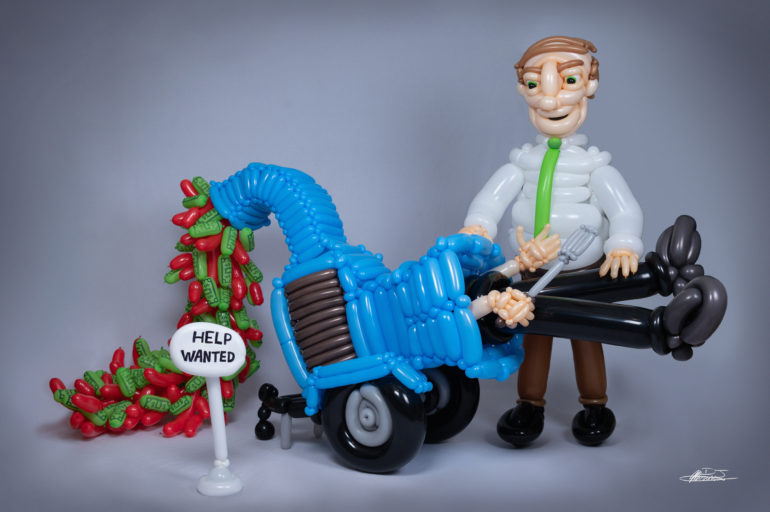
All images by DJ Morrow. Used with permission. Visit his website as well as his Facebook and Instagram pages to see how he creates his amazing work.





